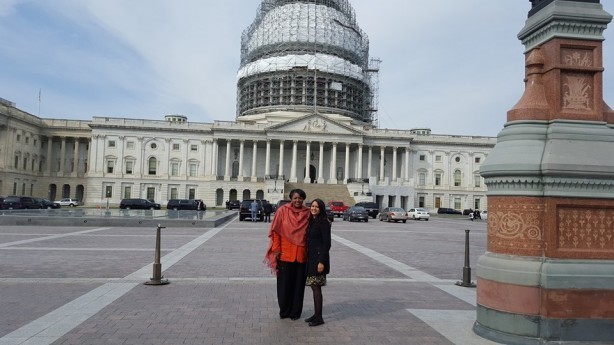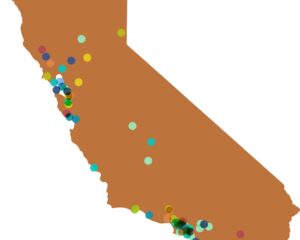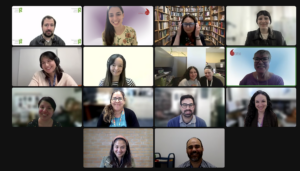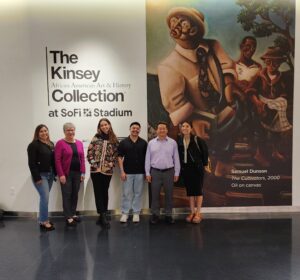This past March 1 – 3, the California Humanities Board Chair and I joined three members of the outstanding California Humanities staff in Washington, DC for Humanities on the Hill, the annual three-day advocacy effort led by the Federation of State Humanities Councils. Altogether, the individual state humanities councils visited the offices of 500+ lawmakers, educating Congressional andSenatorial staff (and on occasion, lawmakers themselves) about the humanities and seeking support for the $155 million appropriations request for the National Endowment for the Humanities (NEH) that includes a $46 Million line item for the states.
 With 53 Members of the U.S. House of Representatives and 2 U.S. Senators, the California Humanities council had the largest delegation to cover. Our California Humanities team (Board Chairman, Tricia Wynne; President & CEO, Julie Fry; External Affairs Coordinator, Jody Sahota; Special Projects Associate, Neha Balram; and I) met this challenge by working in two squads, dividing the visits between us, and starting a day ahead of the formal Federation of State Humanities Councils agenda.
With 53 Members of the U.S. House of Representatives and 2 U.S. Senators, the California Humanities council had the largest delegation to cover. Our California Humanities team (Board Chairman, Tricia Wynne; President & CEO, Julie Fry; External Affairs Coordinator, Jody Sahota; Special Projects Associate, Neha Balram; and I) met this challenge by working in two squads, dividing the visits between us, and starting a day ahead of the formal Federation of State Humanities Councils agenda.
We were ambitious, enthusiastic, and (thanks to Jody) tightly scheduled and well-prepared with compelling talking points and customized briefing folders with attractive pullouts describing our statewide initiatives and California Humanities’ record of grantmaking in specific Congressional districts. We canvassed the halls of the Cannon, Longworth and Rayburn House Office Buildings and the Hart Senate Office Building where the offices of Senator Boxer and Senator Feinstein are both located. In total, our team had 39 meetings with key Republican and Democratic staff (and in some cases we met with or were greeted by the Member) and delivered an additional 14 briefing folders to the Congressional offices where we did not have appointments.
In our conversations, we talked about how the humanities enrich the lives of all Californians in big and small ways. We talked about how the humanities give us the capacity to share our own stories and to understand the lived experience of others – essential elements of strong, satisfying and inclusive communities.
We highlighted recent outcomes of California Humanities’ work to empower our diverse communities to share, to understand, and to meaningfully connect with one another. Among other things, we talked about the significant impact of our initiatives concerning veterans’ experiences with war and homecoming, including the award-winning War Ink – an interactive exhibit of veterans’ body art, and Literature and Medicine – part of a national effort to improve the quality of patient care through humanities approaches. We talked about our Academy Award nominated documentary, Last Day of Freedom and we talked about our upcoming On the Road with California Humanities series featuring Pulitzer Prize winners in dialogue with distinguished thought leaders and local communities about contemporary issues affecting our shared future as Californians. Last but not least, we talked about our ongoing grants programs, the California Documentary Project and Community Stories.
We talked about the need for strong support for the NEH funding and the $46 Million Federal/State Partnership line item. We talked about how historically we have been able to leverage this federal support into a 5:1 match of private and foundational support for each dollar awarded. We emphasized California Humanities’ excellent stewardship of our $2.2 Million allocation and the extraordinary success of our own efforts to leverage local resources. And, with a pullout map of the state, we effectively illustrated how widely California Humanities funded programs are distributed throughout the state.
We asked that each of our California lawmakers sign the “Dear Colleague” letter regarding the NEH appropriations request that was circulated by the chairs of the Humanities Caucus.
Finally, we asked to maintain an ongoing dialogue at the local level. Where we didn’t already have an established relationship, we asked for an introduction to the key staff person in the Congressional District. We asked each office for recommendations about whom to connect with on the ground to ensure that opportunities to partner with California Humanities are better promoted and accessible across the state.
I’m deeply gratified to report that our visits were well-received and that California Humanities is valued and respected as an organization. It was a pleasure to meet with Members personally and to hear their ideas about how our work might benefit the communities they serve. We found staff to be attentive to our concerns and willing to follow up with feedback and questions. A few staff assured us that their Member would sign on to the “Dear Colleague” letter, some were interested in helping us to convene grant workshops in their district, and several promised to connect us with local colleagues and constituents.
As a former professional staff member with the U.S. House of Representatives, I was honored to return to Capitol Hill as an advocate for the humanities and as a Director of California Humanities. I enjoyed my Humanities on the Hill adventure and feel confident that my fellow advocates (Tricia, Julie, Neha and Jody) enjoyed the experience as well.





